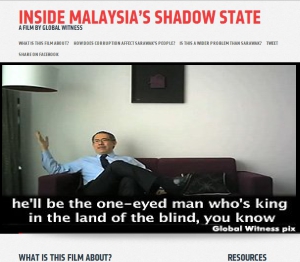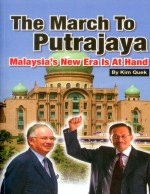 Keruah Usit
Keruah Usit
If the government is serious about reforming health care, it would do well to listen to Parti Sosialis Malaysia (PSM) Sungai Siput MP and secretary of the national Coalition Against Health Care Privatisation, Dr Michael Jeyakumar Devaraj.
Jeyakumar , a chest physician, has spent his working life caring for some of the poorest people in Malaysia.
He served 16 years as a government doctor until, he says, local MIC strongmen exerted political pressure on government health officials to force him out.
 He then spent 13 more years looking after patients, whether well-off or poor, in the private sector.
He then spent 13 more years looking after patients, whether well-off or poor, in the private sector.
He has cycled to rubber estates to teach tappers’ children, and has stood up for urban pioneers threatened with eviction.
He also spent a month in jail, under the Emergency Ordinance, as part of the authorities’ ham-fisted efforts to discourage Malaysians from taking part in the Bersih 2.0 rally last July.
Jeyakumar told Malaysiakini that the government’s proposed 1Care reform is incurably vulnerable to corruption.
“I honestly believe that we should not proceed with any reform with the present bunch of kleptomaniacs in office!” he said candidly.
“We need to have institutional checks and balances to (stop) the widespread pilfering of public assets before we allow the creation of a RM40 billion health fund.”
The People’s Proposal
The People’s Proposal, a blueprint for health care reform, was drafted by 81 civil society members of the coalition way back in 2006, when foreign consultants were already drawing up new health care insurance plans.
The People’s Proposal stated clearly that the Malaysian government must meet its responsibility to provide equitable and adequate health services to the rakyat.
The People’s Proposal urged that the government health budget be increased to a healthier 5 percent of the gross domestic product, as recommended by the World Health Organisation.
 As an illustration of under funding for public health, in 2008, government health care spending was barely 2 percent of GDP or RM14 billion. Compare this to RM14.7 billion spent, for example, on defence.
As an illustration of under funding for public health, in 2008, government health care spending was barely 2 percent of GDP or RM14 billion. Compare this to RM14.7 billion spent, for example, on defence.
The People’s Proposal also insisted that the government must involve civil society groups in the planning of any reform, to ensure accountability.
Any proposed national health authority must be transparent and must be established by an Act of parliament.
“The government’s primary focus must be on strengthening the present public sector health care delivery system… comprehensive health must be available for all, irrespective of their ability to pay,” the coalition urged.
The proposal also demanded that any “essential package” provided by a national health insurance fund for GP or hospital care “must include all treatment options available in the present public health delivery system”.
This reasonable requirement has been met by vague and unconvincing assurances by the health ministry that all will have access to “basic care” packages, if the national insurance scheme goes ahead in the face of angry resistance.
Testing the waters
The government is currently testing the waters of public opinion with half-baked “consultations” with stakeholders – predominantly private doctors and pharmacists.
It has failed to meet any of the modest demands of The People’s Proposal.
Private health care exploded in the 1980s, thanks to Mahathir’s orgy of privatisation. Since then, 30 percent of Malaysia’s specialists in public hospitals have been looking after 70 percent of the nation’s patients.
Jeyakumar pointed out that improving public health care would reduce demand and spending for private treatment.
When asked regarding reforms to limit out-of-pocket (OOP) spending on private health care, he replied: “Easy! We should put a moratorium on the expansion of private hospitals. No new private hospitals, and no expansion of beds in the existing hospitals.”
This reversal of Mahathir’s privatisation efforts would certainly meet with resistance from crony companies linked to the ruling party, for they run chains of lucrative private hospitals.
But Jeyakumar argues this would “lead to the increase in the quality of care in the public hospitals as more of the specialists will stay back in the government sector… the ‘push’ or fear factor driving private hospital admissions will abate, and the prices will go down”.
“The freeze of private hospital expansion would help reduce the ‘pull factor’, while improving service conditions in the government sector – best attained by setting up a separate service commission for government health workers (instead of having the pay fixed by the Public Services Department or JPA) – would reduce the ‘push factor’ for brain drain.”
Some conscientious doctors, in private and public practice, agree with Jeyakumar.
Limited demand for expensive private care would always exist, they say, since some patients value choice and personal comfort above all other considerations.
“You can’t discourage someone who wants to eat at a buffet at a flashy hotel every day,” one senior doctor said. “But if you improve the funding and management in the government hospitals, you’d definitely reduce demand for private care.”
There are other, more immediate ways too, besides 1Care to reduce government expenditure on health.
The abolition of the privatisation of hospital cleaning and technical services to Faber, Radicare and Pantai, and of cartels such as pharmaceutical supplies by Pharmaniaga and health screening by Fomema would slash costs.
Open tenders for companies supplying and building hospitals and clinics would make public health care far cheaper and safer.
But it is clear that Jeyakumar’s proposals, and these lucid ideas for reform, are not the voices heeded by the politicians and corporations behind 1Care.
KERUAH USIT is a human rights activist – ‘anak Sarawak, bangsa Malaysia’. This column is an effort to provide a voice for marginalised Malaysians. Keruah Usit can be contacted at keruah_usit@yahoo.com






















trust me… after partially privatised G hospital sector in Malaysia to Faber,Pantai and Radicare…soon separate dispensing bill will come into place… dr can only give prescription and patient pay for it..and next after that patient will buy meds from the Pharmacy…. Most Pharmacist has been driven by someone to for go with this system, while most Drs are against such implementation… we all need to wake up….TDM is nearly completing his mission to privatised the WHOLE health in Malaysia..with VT mushrooming his Cosway Pharmacy all over the place…
Comment by han — January 16, 2013 @ 5:42 PM |
“The abolition of the privatisation of hospital cleaning and technical services to Faber, Radicare and Pantai, and of cartels such as pharmaceutical supplies by Pharmaniaga and health screening by Fomema would slash costs.”
SUCH A BUNCH OF LUCKY CRONIES EHHHHHHH!!!!!!!!!!
_______________________
Govt extends Faber hospital support services for 6 months
By Joseph Chin, The Edge Malaysia – Thu, Oct 27, 2011
KUALA LUMPUR: The federal government has extended Faber Group Bhd’s hospital support services concession for an interim period of six months, starting Friday, Oct 28.
It said on Thursday it unit Faber Medi-Servce Sdn Bhd had received a letter from the Public Private Partnership Unit of the Prime Minister’s Department about the extension of the contract.
Faber said the extension was subject to the prevailing terms and conditions of the concession or until the signing of a new concession agreement for the privatisation of services with the Health Ministry, whichever is the earlier.
“The six months interim extension is not to be considered as binding on the Government of Malaysia,” it said.
Faber said more announcements would be made concerning the privatisation of the services when the negotiations with the government have concluded.
____________________
Faber up on news of contract renewal
The Star, Friday December 30, 2011
PETALING JAYA: Faber Group Bhd shares rose 10.2%, its steepest increase in two months, to RM1.62 after StarBiz reported that its subsidiary is likely to have its hospital support services contract with the Government renewed within the next month.
The stock added 15 sen on volume of 3.79 million shares, making it one of the most actively traded among yesterday’s top gainers.
StarBiz yesterday reported that Faber’s wholly-owed unit, Faber Mediserve Sdn Bhd, and two others – Pantai Medivest Sdn Bhd and Radicare (M) Sdn Bhd – may get a 10-year extension of their concessions to provide services such as laundry, cleaning, and clinical waste management to government hospitals.
The three companies are currently providing support services for all government hospitals and clinics and a selected number of private healthcare companies.
In a note to clients, OSK Research said the concessions were supposed to have expired in late October but were extended for six months till April next year pending negotiations on the renewal of the contracts.
“We view the news favourably as this indicates that negotiations are progressing well, with the final decision on track to be announced before the extended deadline of April next year.
“We reiterate our view that despite the delay, Faber would eventually get its concession renewed, going by its strong 15-year track record since the company’s concession started on Oct 28, 1996,” the research house said.
OSK Research has maintained a “trading buy” on Faber with fair value of RM2.24.
____________________
3 firms likely to get hospital support services concession renewal
By DANIEL KHOO, The Star, Thursday December 29, 2011
KUALA LUMPUR: Three parties – Faber Group Bhd’s wholly-owned subsidiary Faber Mediserve Sdn Bhd, Pantai Medivest Sdn Bhd and Radicare (M) Sdn Bhd which are vying for the hospital support services (HSS) concessions by the Government are likely to get their contracts renewed within the next month, according to sources close to the matter.
“Yes, I know the contract had been extended for a duration of six months initially, but the contracts will be extended for the next 10 years. This announcement will be made within a month,” a source said.
According to sources, the Government had renewed the contract for a period of six months initially and had called for a tendering process by these three companies about a month before their contracts ended in October 2011.
“We have reached an initial consensus decision to get their contracts renewed. We will inform them in due course through official channels,” the source added.
It is learnt that Faber, Pantai Medivest and Radicare were the only companies which were called to submit their tenders for renewal because of their experience and expertise in providing HSS for hospitals in Malaysia.
The three companies are presently providing HSS for all government hospitals and clinics in Malaysia and a selected number of private healthcare companies.
The contract value is not fixed when the concession is granted but it is estimated that these three companies had raked in a total of RM1.1bil in revenue from these government concessions alone last year.
It is learnt that the revenues raked in per annum by these three companies were not fixed per se as this very much depended on how much actual volume was handled by each respective company. Should the volume increase due to the increased number beds per hospital or any extension by the hospitals that required their services, revenues to these companies would rise accordingly.
Industry sources said that of the three, the only listed entity was Faber, which has a 50% market share in terms of revenues, while Radicare was the second largest with a 30% market share, and Pantai Medivest with a 20% share.
Faber’s concession covers 81 government hospitals in the Perak, Kedah, Penang, Perlis, Sabah and Sarawak; while Pantai Medivest’s concession covers about 25 government hospitals in the southern region of Peninsular Malaysia; and Radicare’s portion includes government hospitals in the Federal Territory of Kuala Lumpur, Selangor, Kelantan, Terengganu and Pahang.
HSS’ activities cover the upkeep and cleansing of linen and laundry, biomedical engineering management services, facilities engineering maintenance services, clinical waste management services, hospital planning development services and cleaning and upkeep of the hospital building infrastructure.
These comprise a crucial link to the government healthcare system which provides maintenance of government hospital and healthcare infrastructure.
Faber is 34.3% owned by the Government’s investment arm, Khazanah Nasional Bhd, 12.5% owned by unit trust company Universal Trustee Malaysia Bhd, and about 10% by Lembaga Tabung Haji.
Other than being a HSS provider for Malaysian government hospitals and those in India and the United Arab Emirates, Faber also derives a portion of its revenues from property development projects. This figure fluctuates from quarter to quarter depending on the progress of its property projects.
According to the notes in its financial statements, in the third quarter of its financial year ending Dec 31, 2011 (FY11), Faber derived 16% of its revenue from the property industry while the rest came from the integrated facilities management (IFM) services portion of which the HSS segment is also parked under.
Government HSS contracts contributed to 45% of its third-quarter revenue in FY11 compared with a 74% contribution in the second quarter due to additional incoming revenue stream from overseas IFM services in the third quarter.
Faber recorded profit before tax margins from government HSS concessions of an average of about 15% in both the third and second quarters.
Comment by Kamus — February 29, 2012 @ 11:24 AM |
Yes, there is an alternative to 1Care – just cancel it! No other alternative than stop it for good!
1Care goes long way originated from Dr Mamak 1980s 1990s privatisation plan in healthcare services.
And this Privatisation in the name but actually total Piratisation for UMNO Kronies where Privatisation causing govt cost to increase instead of lower it!
Look at the long-term healthcare service/supply contracts – mostly renewed with such a hurry and allowed revision later! Why?
Very wrong, sinful, unfair to burden the poor with substandard health services and now more cost to spread in the name of equal contribution!
But very lucrative for UMNO Kronies to enjoy renewed ong-term healthcare service/supply big fat contracts !
HA HA HA LOOK AT THE T-SHIRT HOW VERY TRUE!
1CARE – ORANG MISKIN DILARANG SAKIT!
1CARE – KALAU SAKIT, KRONI UMNO MAKIN KAYA RAYA!
YOU SICK, UMNO KRONI KAYA RAYA!
STAY HEALTHY, UMNO KRONI STILL KAYA RAYA GET PAID CONTRACT!
BRAVO 1CARE BRAVO! HA HA HA!
_______________________
Govt to take over Pharmaniaga medical labs in 2019
Rembau MP: “…Why the terms and conditions were being negotiated over the next six months AFTER agreement was extended?”
The Star, Tuesday December 15, 2009
THE Government will take over the management of the Health Ministry’s medical laboratory and store from concessionaire Pharmaniaga Bhd in 2019.
Deputy Health Minister Datuk Rosnah Abdul Rashid Shirlin said the Pharmaceutical Services Division had suggested the takeover as it would lead to significant savings.
“From the list of medicine supplied, 370 types of medicine (25%) were supplied by Pharmaniaga which in turn received the supplies from its network of 55 small suppliers,” she told Hee Loy Sian (PKR – Petaling Jaya Selatan).
Pharmaniaga’s concession agreement on the medical laboratory and store had been extended for 10 years from Dec 1, she said.
On Khairy Jamaluddin’s (BN – Rembau) supplementary question on why the privatisation was not taken over by the Government on Dec 1, Rosnah said the ministry received the proposal in March to continue with the concession but the division did not object to the concession renewal.
Khairy also asked whether the tender was open to other players when the Government was considering extending Pharmaniaga’s concession.
He was also perplexed as to why the terms and conditions were being negotiated over the next six months after agreement was extended, noting that the company’s managing director, Mohamad Abdullah, had said on Dec 5 that the agreement was subject to terms and conditions which could be negotiated over a period of six months from Dec 1.
_______________________
Pharmaniaga’s FY11 net profit up 74%
Full-year 2011 revenue grew 10% to RM1.52 billion, net profit rose 74% to RM52.8 million
The Sun Daily, 22 February 2012
KUALA LUMPUR (Feb 22, 2012): Pharmaniaga Bhd turned in a net profit of RM12.2 million in the fourth quarter ended Dec 31, 2011 after a loss of RM2 million the year before, mainly due to growth in its logistics and distribution division.
For full-year 2011, net profit rose 74% to RM52.8 million from RM30.3 million in FY10. Revenue grew 10% to RM1.52 billion against RM1.38 billion.
Earnings per share were 44.32 sen.
To date, Pharmaniaga has paid dividends amounting to nine sen for FY11, and will pay another 21 sen on March 28. This brings total distribution for the year to RM31.9 million, representing a 61% payout ratio.
Pharmaniaga chairman Tan Sri Lodin Wok Kamaruddin said majority shareholder Boustead Holdings Bhd, which took over the management of the company in the second quarter of last year, has been able to improve the shareholder spread from 2% at the completion of its general offer to 17% currently.
“They are, at present, working to further pare down their stake to meet the shareholder spread of 25%, as Pharmaniaga looks forward to strengthen its earnings potential in the coming financial year (FY12),” he said in a statement yesterday.
_____________________
Pharmaniaga acquires Boustead’s pharma divisions
by Andrea Mathew, Malay Mail, Thursday, December 22nd, 2011
KUALA LUMPUR: Pharmaniaga Bhd has acquired Idaman Pharma Manufacturing Sdn Bhd and Idaman Pharma Sdn Bhd for a total of RM99.73 million in efforts to consolidate Boustead’s pharmaceuitical divisions in the country.
This will mean all pharmaceutical divisions under Boustead will be transferred to Pharmaniaga, largest integrated local healthcare company in Malaysia.
A subsidiary of Boustead Holdings Bhd, Pharmaniaga Bhd will see RM95 million capex allocation for the next year.
Pharmaniaga managing director Datuk Farshila Emran (pic) said: “Out of this amount, one-third will go towards its pharmacy information system.
She added: “Pharmaniaga plans to spend about RM30 million between 2012 and 2015 for its Sungai Petani plant expansion project and to upgrade equipment and facilities.”
“We are also looking at pumping RM23 million into the construction of a new plant in Perak, as well as, to expand the existing plant in Seri Iskandar, Perak,” Farshila told reporters after the extraordinary general meeting (EGM) of Boustead Holdings and Pharmaniaga yesterday.
The EGM saw shareholders agreeing to the acquisition of two other Boustead’s pharma divisions by Pharmaniaga.
Some of the developments the company has seen in the last year is the reduction of concession delivery from 60 days to seven days for West Malaysia and 10 days for East Malaysia.
Boustead Holdings Bhd deputy chairman and group managing director Tan Sri Datuk Lodin Wok Kamaruddin said Pharmaniaga would contribute about 10% to Boustead’s bottomline beginning next year and this was expected to increase gradually to 15% over the next two to three years.
“The health sector, including pharmaceuticals, is one of the 12 National Key Economic Areas. We believe the prospects and future for the pharmaceutical business is going to be good,” he said.
Pharmaniaga, the largest integrated local healthcare company holds a 10-year concession to purchase, store, supply and distribute pharmaceuticals and medical products to 3,750 government hospitals and clinics nationwide.
Pharmaniaga’s book value is worth some RM900 million a year.
______________________
Dr M’s argument on 1Care is ‘warped’
by Stephanie Sta Maria, FMT, February 17, 2012
A health activist blames Mahathir’s healthcare reforms for the dismal state of the country’s healthcare system today.
PETALING JAYA: Former premier, Dr Mahathir Mohamad’s, defence of the proposed 1Care healthcare system as a means to counter the rising cost of healthcare has come as no surprise to the Citizens Healthcare Coalition (CHC).
Mahathir had said that the government could no longer support the country’s current healthcare costs alone and that the need for contribution towards healthcare could be valid.
But CHC representative, Dr T Jayabalan, said that Mahathir’s comments were to be expected as he was the “architect of healthcare reforms” in 1983.
“By 1994 the pharmaceutical services were privatised, but with the government being a stakeholder,” he said in a statement.
“With the privatisation came a 15-year monopoly for pharmaceutical supplies to the government health facilities by Pharmaniaga. It was a closed tender and this disallowed competition.”
An online news report had earlier noted that “1Care aims to place private medicine under government control, a step further than Dr Mahathir Mohamad’s sweeping health privatisation upheavals in the 1980s that delivered a hefty windfall to Umno’s partners, including Dr Mahathir’s son Mokhzani.”
Jayabalan stated that privatisation had caused the prices of generics to sky-rocket, subsequently denying the underprivileged and the less fortunate access to medicines.
He added that the privatisation process had also involved co-payment by the patient wherein the patient had to purchase essential drugs and devices that were expensive and not in the inventory.
“A study by researchers from Universiti Sains Malaysia (USM) in 2008 on pre and post privatisation prices of drugs showed a price increase of 10.42% from 1995-1996 compared to the pre-privatisation price,” Jayabalan quoted.
“There was also a massive price increase of 64.04% in the prices of drugs from 2001-2003. The study also indicated that drug prices don’t match the inflation rate or the Consumer Price Index (CPI).”
Poor can’t afford IJN
Jayabalan used the National Heart Institute (IJN) as an example, saying that its corporatisation made it the costliest specialists centres in the country where the poor wait for about two years for treatment while the rich are allowed to schedule overnight surgeries.
“This is what privatisation does and we can credit Mahathir for this dismal state of affairs,” he said.
“It is a warped argument to suggest that rising costs of pharmaceuticals has made healthcare unsustainable since the government only spent 2% of its annual gross domestic product (GDP) on healthcare over the last 13 years.”
Jayabalan called the privatisation of healthcare a “great disservice to the people” as up to 70% of Malaysians are dependent on public facilities.
“Healthcare is a public good and should not be made to fit into a market system,” he asserted.
1Care has sparked outrage from industry practitioners and consumer associations who claim that wage-earners would be forced to contribute 10% of their income to a government-run insurance scheme.
The new scheme however is said to provide limited benefits and force the public to fork out more money for basic healthcare.
Comment by Kamus — February 29, 2012 @ 11:20 AM |
kleptomaniacs only care about filling their pockets ; never the public’s health… Just another of their schemes to defraud. They are getting bolder and BOLDER cos they control EVERYTHING as they are the Mafia.
Comment by kay — February 29, 2012 @ 9:55 AM |